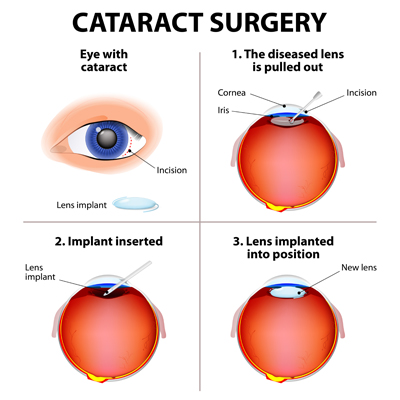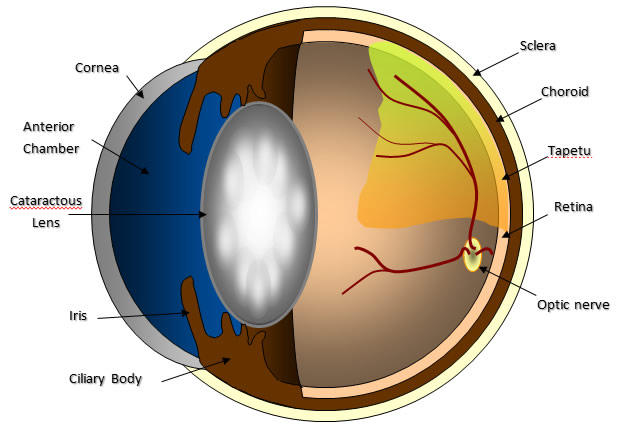Cataract Surgery
Overview
Cataract surgery involves replacing the cloudy lens inside your eye with an artificial one. It’s the most common operation performed with a high success rate in improving your eyesight. It can take 4 to 6 weeks to fully recover from cataract surgery.
What are cataracts?
Cataracts are when the lens of your eye, a small transparent disc, develops cloudy patches. When we’re young, our lenses are usually like clear glass, allowing us to see through them. As we get older they start to become frosted, like bathroom glass and begin to limit our vision. Cataracts most commonly affect adults as a result of ageing.

Do you need surgery?
If you have cataracts, it’s your decision whether or not to go ahead with cataract surgery. Cataracts usually get slowly worse over time. Surgery to replace the cloudy lens is the only way to improve your eyesight. Surgery is usually offered if your cataracts are affecting your eyesight and quality of life. The decision to have surgery should not be based solely on your eye test (visual acuity) results. You may have other personal reasons for deciding to have surgery, such as your daily activities, hobbies and interests. You can choose to put off having surgery for a while and have regular check-ups to monitor the situation.
There are no medicines or eye drops that have been proven to improve cataracts or stop them from getting worse.
Before the operation
Before surgery, you’ll be referred to a specialist eye doctor for an assessment. During the assessment, different measurements will be taken of your eyes and your eyesight.
The assessment is an opportunity to discuss anything to do with your operation, including:
– your lens preference, such as near sight or long sight
– the risks and benefits of surgery
– if you’ll need glasses after surgery
– how long you’ll take to fully recover
If you’re used to using one eye for distance and one for reading, which is called monovision, you can ask to stay that way. This usually means you’ll get a near sight lens fitted in one eye and a long-sighted lens fitted in the other eye.
The Operation
Cataract surgery is a straightforward procedure that usually takes 30 to 45 minutes. It’s often carried out as day surgery under local anaesthetic and you should be able to go home on the same day. During the operation, the surgeon will make a tiny cut in your eye to remove the cloudy lens and replace it with a clear plastic one. You will usually be offered
If you go private, you may be able to choose either a multifocal or an accommodating lens, which allow the eye to focus on both near and distant objects. Most people will need to wear glasses for some tasks, like reading, after surgery regardless of the type of lens they have fitted. If you have cataracts in both eyes, you’ll need two separate operations, usually carried out 6 to 12 weeks apart.
This will give the first eye to be treated time to heal and your vision time to return.
Benefits of surgery
After cataract surgery you should be able to:
1. see things in focus
2. look into bright lights and not see as much glare
3. tell the difference between colour
If you have another condition affecting your eyes, such as diabetes or glaucoma, you may still have limited vision, even after successful surgery.
Risks of surgery
The risk of serious complications developing as a result of cataract surgery is very low. Most common complications can be treated with medicines or further surgery. There is a very small risk – around 1 in 1,000 – of permanent sight loss in the treated eye as a direct result of the operation.
POST OPERATIVE INSTRUCTIONS
YOU ARE URGED TO FOLLOW THESE INSTRUCTIONS CAREFULLY
|
Keep your follow up the appointment as scheduled.
Observe the operative area for signs of excessive bleeding. Elevate your head and contact your physician at once if this occurs. Some drainage is normal and expected.
Observe operative areas for signs of infection: Increased pain, Redness Swelling Foul odor or drainage Increase in temperature (101 or higher)
These signs and symptoms usually become apparent in 36 to 48 hours. If present, contact your physician.
Keep operative areas clean and dry. If you have a dressing or eye shield, do not remove it unless instructed to do so by your physician.
BEFORE USING EYE DROPS, WASH HANDS.
Follow the Physician standing instruction sheet which is given to you.
|
REGARDING ANESTHESIA If you had general anesthesia or local anesthesia with sedation, please pay particular attention to the following instructions.
Do not drink alcoholic beverages including beer for 24 hours. Alcohol enhances the effects of anesthesia and sedation.
Do not drive a motor vehicle; operate machinery or power tools for 24 hours. If a child, no bicycle riding, skateboards, gym sets, etc. for 24 hours.
Do not make any important decisions or sign legal documents for 24 hours.
You may experience lightheadedness, dizziness and sleepiness following surgery. Please DO NOT STAY ALONE. Responsible adult should be with you for 24 hours.
Rest at home with moderate activity as tolerated.
Progress to a regular diet as tolerated.
Certain anesthetics and pain medications may produce nausea and vomiting in certain individuals. If nausea becomes a problem at home, call your physician.
|
If you have any further questions please contact your physician immediately. If you should experience difficulty in breathing, bleeding that you feel is excessive, any pain that is unusual, swelling or fever please call your physician. If you find that you cannot contact you physician but feel your signs and symptoms warrant a physician’s attention, call an ambulance, or get to the emergency room closest to you.
We wish you a pleasant and uneventful recovery in the comfort of your home.
Contact Information
Address: Suite 7B, 34 Lady Musgrave Road, Kgn 5
Tel: (876) 630-0958; 630-0864; 759-6449
Email: ophthalmicsuites@gmail.com
Doctors
Dr. Jeffery Zimm
Dr. Miguel Lopez
Dr. Frine Salazar

